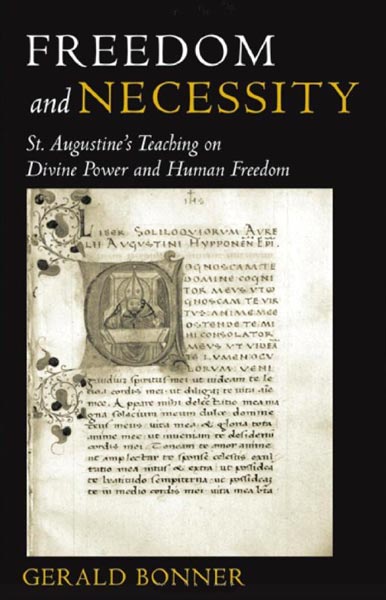 Freedom and Necessity Freedom and Necessity
St. Augustine's Teaching on Divine Power and Human Freedom
Gerald Bonner
Narrated by Mitch Leopard
Available from Audible
Book published by Catholic University of America Press
Aurelius Augustinus (354-430), bishop of Hippo Regius (the modern Annaba in Algeria), is considered one of the outstanding thinkers in Western Christian civilization, Catholic and Protestant alike. Particularly influential has been his pessimistic doctrine of divine predestination, which holds that only a small proportion of humanity has been selected by God for salvation, while the overwhelming majority, including all unbaptized persons, are damned. Yet, paradoxically, Augustine's exposition of the Eucharistic unity of the elect in the Body of Christ, his Christology, and his emphasis on love as the principal mark of the Godhead have provided a pattern for Christian devotion and spirituality down through the ages.
This book seeks to explain this paradox in Augustine's theology by tracing how these different emphases arose in his thought, and speculating as to why he endorsed, in the end, his theology of predestination. The book is intended not only for students of theology and church history, but even more for readers attracted to Christian doctrine. Written in straightforward language, it supplies adequate references to original sources for those wishing to further pursue the subject.
The author, a historian turned theologian, has studied Augustine for more than sixty years and seeks neither to extenuate nor to condemn him, but to depict his thought. His book will prove fruitful for all who engage it.
REVIEWS:
“As a well-known and respected Augustinian scholar, Gerald Bonner does a masterful job of shedding light on this paradox found in the writings and sermons of Augustine.... His book will prove very helpful not only to the person already engaged in the study of Augustinian theology but also the initiate as well.”
—Catholic Books Review “A remarkable tour de force, something which only an erudite Augustine scholar such as Gerald Bonner is able to accomplish.... The author's lucid literary style, with its meticulous choice of wording, makes this book a pleasure to read and a storehouse of quotable phrases. He amply demonstrates his familiarity with various writings of Augustine (his anti-Pelagian writings, epistles, sermons, early dialogues, and, of course, his masterpieces, Confessions, De civitate Dei, De Trinitate), which greatly contributes to the richness of the work. This fine study not only provides a refreshing, balanced view of Pelagianism, it does the same of Augustine.... Each chapter of this concise publication contains such a wealth of insights and enough food for thought to make it worth reading again and again.”
—Geert Van Reyn, Augustiniana “Bonner writes with sensitivity and complexity on Augustine's views of freedom, responsibility, and predestination. ”
—Speculum “This book is the fruit of many years of thought and writing. Its author writes with a clarity which reflects this quiet maturing of its conclusions.... Bonner is visibly working out not just what Augustine really thought and why, but what is to be made of it by the modern believer, including himself. This is an approach Augustine himself would have warmed to. He liked nothing better as an author than an honest working out of experimental answers to difficult but hugely important questions.”
—Gillian Evans,Theology
|

